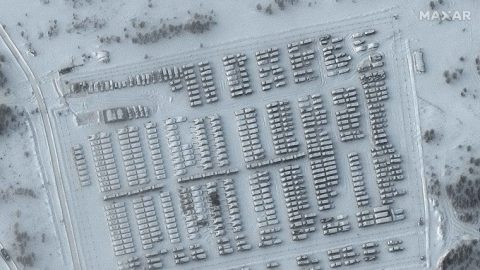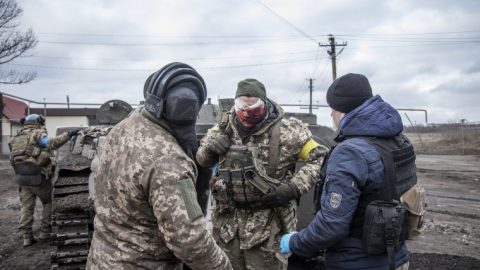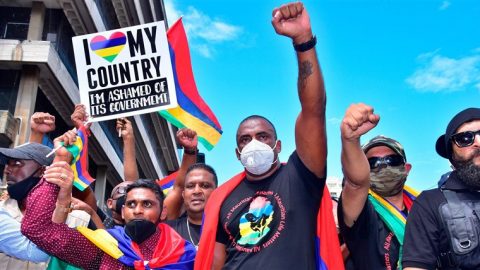More than two months after elements of the military seized power in Niger, the Biden administration is close to officially designating the overthrow of the country’s elected government a coup, which could weaken the U.S. counterterror effort in Africa, according to three administration officials familiar with the planning.
While the administration is still working through the details of how this would change the U.S. relationship with Niger and affect the presence of U.S. diplomats and troops there, the announcement could come in the next week, the officials said.
An official assessment that the government was overthrown in a military coup would trigger Section 7008 of the Department of State, Foreign Operations, and Related Appropriations Act, a U.S. law that restricts the assistance that the U.S. can provide to a country.
The U.S. military had more than 1,100 troops at three different bases in Niger before the democratically elected president, Mohamed Bazoum, was taken hostage in his residence on July 26 by military officials, led by the head of the Presidential Guard, Gen. Abdourahamane Tchiani.
Prior to Bazoum’s ouster, U.S. troops trained Nigerien military special forces, supported them in planning for counterterror missions, and provided intelligence and remote support during Nigerien military operations.
In the days following the takeover, the Pentagon suspended security cooperation between the U.S. military and Nigerien military, halted foreign military sales and paused some foreign assistance programs.
On Aug. 5, the U.S. halted nearly $200 million in foreign assistance programs to Niger. Officially designating the change in government a coup could suspend hundreds of millions more in assistance, according to a senior U.S. administration official, though some humanitarian and health assistance would be likely to continue.
A State Department spokesperson did not confirm any impending change. “We don’t have anything to announce. We are continuing to advocate for a diplomatic solution that preserves constitutional order and democracy in Niger.”
A spokesperson for the National Security Council said the administration is continuing its “diplomatic engagements to preserve civilian rule in Niger. We have also continued assessing our next steps, including making a formal 7008 determination. If we make a determination, we will announce, but at the moment, I have nothing to preview. I’d note that a formal 7008 determination has been something we have considered since the beginning, nothing new and nothing to announce today.”
Bazoum and members of his family are still being held hostage in Niger, the administration officials said.
ISIS on the attack
The coup has threatened to derail the U.S. effort to fight Islamist militants in Africa’s volatile Sahel region, where Niger has played a pivotal and reliable role as a partner and hub for counterterrorism efforts in the region. In recent years, Niger has also become a melting pot for various terror networks who have exploited coups and instability in neighboring countries and then crossed into Niger to prey on civilians and military along the borders.
Since the July 26 coup, U.S. officials warn there has already been an uptick in attacks by the Islamic State terrorist group along the borders with Burkina Faso and Mali, countries to Niger’s west that have both undergone coups in recent years, as well. The officials say the Nigerien military has been somewhat distracted since the coup and less focused on counterterrorism operations against ISIS, and that ISIS is exploiting that. While the U.S. military does not have concrete numbers, it estimates that dozens of members of the Nigerien military have been killed and wounded in ISIS attacks recently.
Since the president’s overthrow, a group known as the Economic Community of West African States (ECOWAS) has threatened to send troops to Niger to restore him to power. Even though U.S. officials say the ECOWAS nations have neither the troops available nor the will to fight in Niger, the threats have forced the Nigerien military to turn its attention to planning for an outside intervention rather than counterterror operations.
“ISIS is taking advantage of the situation,” a U.S. defense official said.
While ISIS has not been taking land in these attacks, it is trying to expand its reach into Niger and gain influence or power over local populations. The U.S. military believes there are currently fewer than 1,000 ISIS fighters inside Niger, but officials warn the numbers are very uncertain because of the vast parts of the country where the U.S. has no troops or intelligence gathering.
The U.S. military is flying drones in Niger, primarily focused on areas where the US has troops or civilians, the officials said. Despite the coup, the U.S. still coordinates U.S. military movements with the Nigerien military for safety and security of U.S. troops.
The Biden administration is still working through specifics about how the U.S. mission and footprint will change with a coup designation. The U.S. officials did not rule out possible U.S. unilateral counterterror missions into Niger in the future to target ISIS and other terror networks. After a coup determination, some U.S. troops and assets, like armed drones, could be moved elsewhere in the region to continue counterterror operations, the officials said, but declined to say where.










Recent Comments